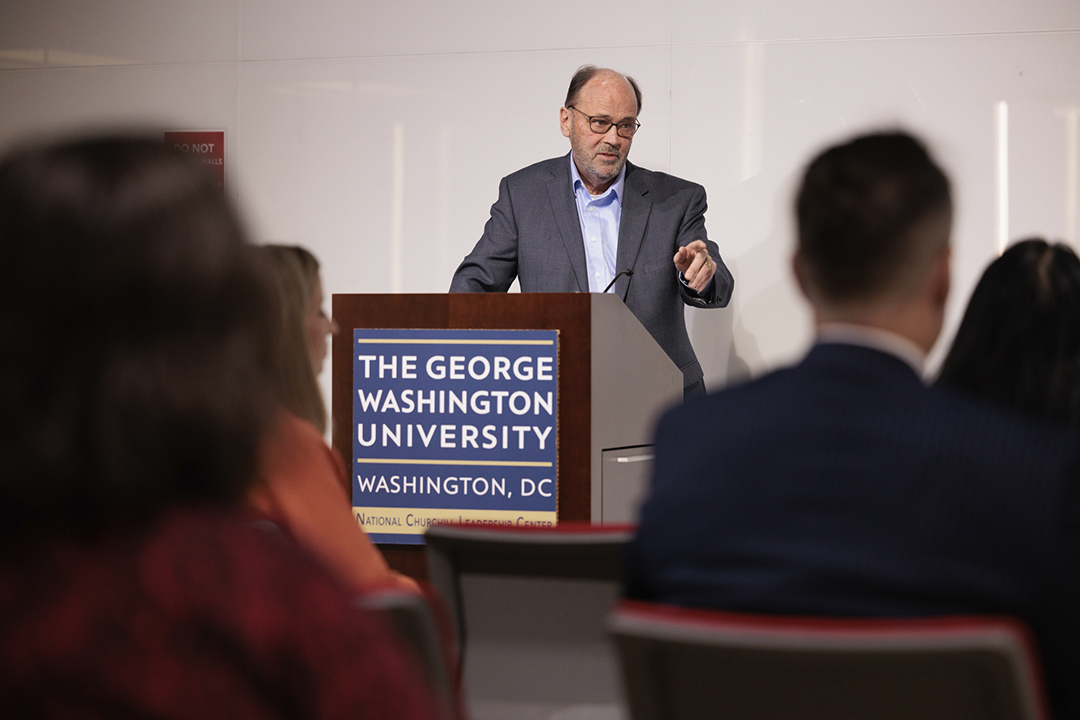The results of a new survey highlighting gaps and distrust between government communicators and the public were presented at George Washington University on February 29.
The GW Government and Public Affairs (GPA) Study, now in its second year, is aimed at understanding the challenges faced by government professionals, identifying strategies to enhance public trust in government messaging and providing valuable insights into the current landscape of government communications.
It includes interviews with over 700 members of three key groups: U.S. adults; communication practitioners from Federal, state and local governments; and practitioners in the private sector.
The GW GPA Study is conducted by GW’s Graduate School of Political Management (GSPM) and Schoen Cooperman Research (SCR), in partnership with the National Association of Government Communicators (NAGC) and Ragan Publishing (PR Daily).
"In our second year of the GPA study, we surveyed members of the public along with communications practitioners. This yielded some important insights, notably the significant gap in the perceived effectiveness of government communications between practitioners and the public. This is a challenge that needs to be addressed to restore trust and one that our degree programs are well positioned to address."
Larry Parnell
Associate Professor and Strategic Public Relations Program Director
Study results were presented by Strategic Public Relations Director Larry Parnell; GSPM Board Member Carly Cooperman, Partner & CEO, Schoen Cooperman Research; and CPS Dean Liesl Riddle. The event included a panel of alumni discussing the results of the study.
Key findings and analysis of the year 2 study presented at the February 29, 2024 event at GW's Gelman Library. Presenters: Larry Parnell, Carly Cooperman.
Key findings from the study include:
- Perception of Government: U.S. adults perceive the government as ineffective, untrustworthy, and driven primarily by political motives. Conversely, communication practitioners within government view it as effective and trustworthy, while those in the private sector align more with the negative outlook of the general public.
- Challenges in Communication: Both U.S. adults and communication practitioners recognize misinformation/disinformation and political polarization as significant challenges to public trust in government messaging. However, while U.S. adults cite dishonesty, communication practitioners in both government and the private sector also attribute the lack of trust to executional issues such as timeliness, audience segmentation and messaging clarity.
- Role of Artificial Intelligence: Despite recognizing the potential benefits of artificial intelligence (A.I.), all three groups express opposition to its use in government communications, citing privacy violations and potential for misuse and a further decrease in trust.
- Impact of 2024 Election: While the 2024 election has not yet significantly impacted non-government communication practitioners' day-to-day jobs, there is widespread concern across both government and the private sector about its impact on their work post-election.
- Employee Activism: Private sector communication practitioners emphasize the importance of employer alignment with their personal values and express support for employee-led activism where appropriate.
Summary:
The GW GPA study underscores the urgent need for increased transparency, tackling misinformation/disinformation, and addressing political polarization to enhance public trust in government messaging. It also reinforces the need for additional training for government communicators, and others, in communications strategy, notably social media usage. The insights gleaned from this study will inform strategic initiatives aimed at strengthening communication strategies at all levels of government, which is a core mission for the school’s Masters in Strategic Public Relations.
Partner Organizations
The Graduate School of Political Management at the George Washington University College of Professional Studies is the first and foremost school of applied politics, advocacy, and communications. For more information, visit gspm.gwu.edu. Connect with GSPM on Facebook, Twitter, and Instagram @GSPMgwu.
The National Association of Government Communicators (NAGC) is a professional membership organization dedicated to advocating, promoting and recognizing excellence in government communication, as well as advancing communication as an essential professional resource at every level of local, state, tribal and national government.
Schoen Cooperman Research is a strategic research consulting firm headquartered in New York, that helps political, corporate, and advocacy partners drive transformative change.
Ragan Communications is a leading resource and publisher of information about corporate communications, internal communication, and employee communications.



